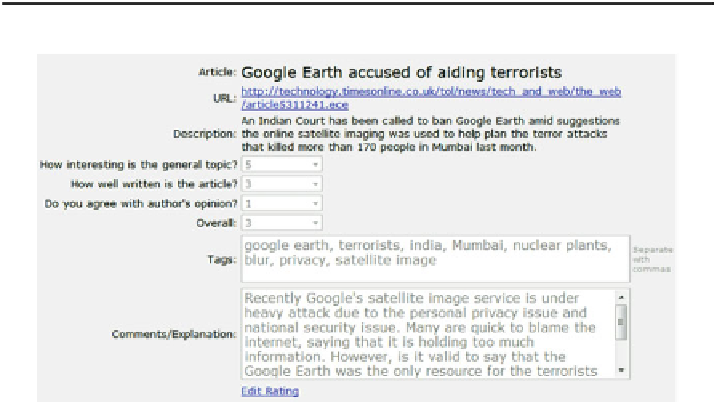Database Reference
In-Depth Information
Table 4.5 Survey questions
Q1
Has the rise in unemployment affected you or someone in your family?
Q2
Given the current state of the economy, are you concerned about getting a job
after you graduate?
Q3
Are you concerned about increased government spending? What if increased
government spending leads to higher tuition cost?
Q4
Are you affiliated with a political party?
Q5
Do you consider yourself conservative, liberal or moderate?
Q6
Does the government do enough to regulate immigration?
Q7
Do you support gay marriage?
Q8
Do you think there is a need for health care reform?
Q9
Should every American have health insurance?
Q10
Do you agree with the use of stem cells for medical research?
Q11
Do you know anyone with an incurable illness who may benefit from stem
cell research?
Q12
Should websites and tools that could be used improperly be outlawed?
(Google Earth, Bit Torrent, P2P, etc.)
Q13
South Korea has a three-strikes law where repeated copyright offenders can be
banned from the Internet? Do you think this is fair?
Fig. 4.5 Form for reviewing an article
Since the students may rate each other differently, i.e., one considers the other as a
friend, but not vice versa, the social relationship in this dataset is directional. The
students were allowed to revise their previous ratings of the articles if they had a
new understanding of the articles after the discussion.
Compared with the Yelp dataset, there are three differences in this dataset. First,
instead of having an overall rating, each article now has three fine-grained ratings
(interestingness, agreement, and writing) which more clearly reflect students'
opinions on the articles. Second, friend relationships are based on buying decision
factors rather just friendship. We are now able to know whether the friendship is
based on their similar interests or similar opinions, etc. Third, since every student


Search WWH ::

Custom Search